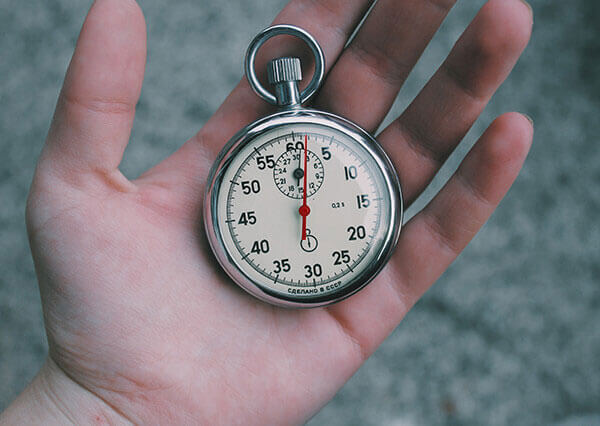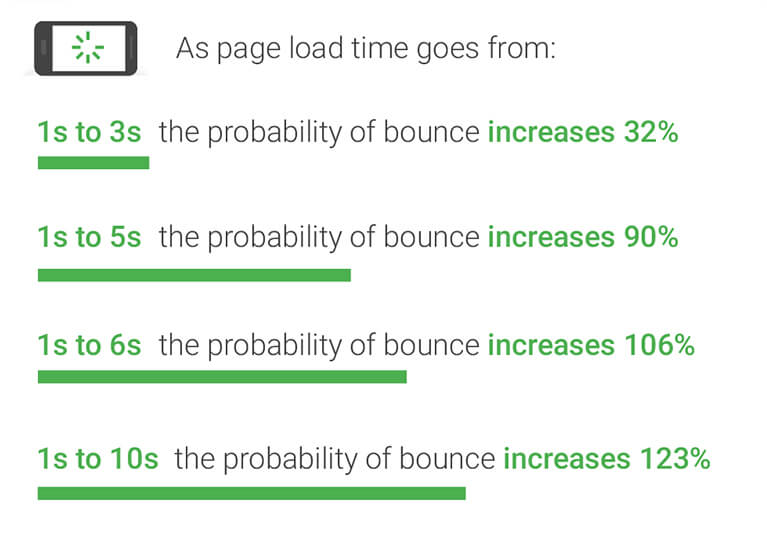To Win the Most Legal Clients, Make Your Website Run Quickly

Everyone dreads the slow status bar.
In our mobile world, internet searching happens mostly on a phone browser. We search for movie times, random facts, restaurants nearby—or for a lawyer.
When that status bar lags, separating us from the information we want, frustration sets in. It’s natural to hit the back button after a few seconds and try another site.
Page speed has become one of the most important factors in search engine marketing. Faster loading times make Google more likely to show searchers your website. Once prospective clients find you, a swiftly moving site increases your success at turning them into signed clients.
“Site speed is something lawyers don’t always think about,” said Mike Crimmins, digital manager at Firmidable. “But when we’re looking at how to improve a law firm’s results, one of the first things we check is how fast their site loads.”
Keep reading to find out:
- The goals you should set for site speed
- How you can achieve those benchmarks
- Where to start
How Fast is a Fast Law Firm Website?
The data—and the dollars—back up the importance of site speed.
One report in Search Engine Journal said half of a website’s visitors will bounce off a site if they have to wait more than three seconds.
Another study found that a 100-millisecond delay can depress the rate of web searchers becoming customers by 7 percent.
Now, imagine a person got hurt at work. They need legal help. They type “workers’ compensation attorney” into Google and, thankfully, your law firm is one of the most prominent results.
Congratulations: your legal marketing strategy has mostly worked! But then the client clicks on your site and gets mired in digital quicksand.
Your potential client was so close to exploring your website, which you’ve loaded with rich, informative content that moves them toward calling you.
Instead, they go back to the search results and find your competitor.
So your next question might be: How fast does my site actually have to be?
Google’s own data suggests the best practice is to get pages loading in three seconds or less. At our legal marketing agency, we’ve found it’s OK to go up to five seconds for most law firms, but no more.
See the below graphic from Google for more context. The results are clear, according to the search engine itself:
“When it comes to mobile pages, speed and size matter. Marketers must keep people engaged on mobile and focus on building mobile-first experiences.
It short, speed equals revenue.”

How to Improve Your Page Speed
Seeing all this data can feel daunting.
When the difference between a good site and a great site is judged in seconds, it’s understandable to wonder what you can do.
But there are plenty of ways to optimize your website for speed, Mike says.
These include:
- Eliminating plugins you don’t need. (Plugins are add-on bits of software that bring certain functions to a site. Over the life of a site, they can accumulate and slow things down.)
- Clean up the underlying code on your site so it runs more efficiently.
- Reduce the file sizes of images. Picture loading is a major factor in site speed.
- Streamline your menus. Simpler menus are faster.
- Streamline interactive features. Slick, clickable sections can be appealing, but you have to be careful about how they affect speed.
When it comes to special design features that can set your site apart—but slow it down—sometimes the challenge is finding the right compromise.
“The whole process is give-and-take,” said Ellie Platt, art director at Firmidable. “You want your website to look beautiful and amazing, but you have to take site speed and performance into consideration.”
A digital marketing agency like Firmidable can run website speed tests and identify your best options for perking up your site.
“It sounds complicated,” Mike said, “but it’s something your marketing team/firm can easily do for you.”
How to Tell if Your Firm Needs a Site Speed Tune-up
Now you know site speed can be crucial to leading clients through your digital, and physical, door.
But before you run any website speed tests or audits of your site’s performance, what signs can you look for that a tune-up is in order?
Head to your homepage and note what you see. Do some pictures load slowly? Does your site lag in responding to clicks, even after it’s fully loaded?
Insiders call sites bogged down by these constraints “heavy.”
Your aim is to go as light as possible, while still delivering a rich, aesthetically pleasing site for your potential clients.
Talk to your digital marketing professional to see what you can do about improving your site speed—because it can help your law firm reach your full caseload potential.
If you don’t have a legal marketing firm doing this work for you, talk to Firmidable today.
Firmidable has been a national expert in legal marketing for almost 30 years. It brings law firms customized, data-driven marketing strategies and services, including online and traditional media for a wide range of legal practices. From Maine to Hawaii, it has transformed the lives of attorneys—and their clients.
